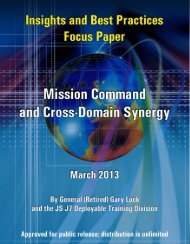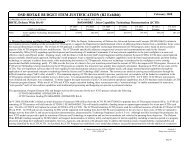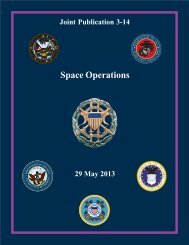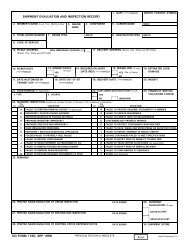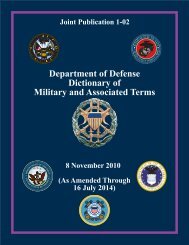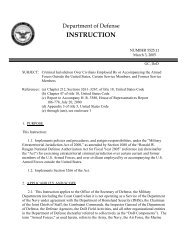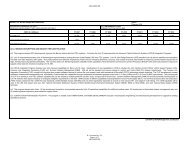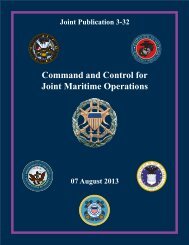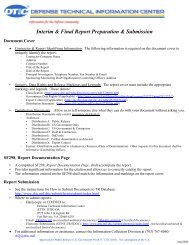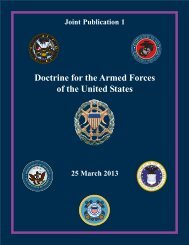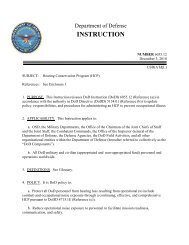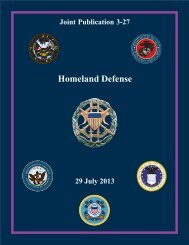JP 3-16, Multinational Operations - Defense Technical Information ...
JP 3-16, Multinational Operations - Defense Technical Information ...
JP 3-16, Multinational Operations - Defense Technical Information ...
Create successful ePaper yourself
Turn your PDF publications into a flip-book with our unique Google optimized e-Paper software.
Chapter III<br />
guidance to subordinate elements that permit flexibility to share information where and when<br />
it is needed.<br />
b. The NDP is implemented within DOD by DODD 5230.11, Disclosure of Classified<br />
Military <strong>Information</strong> to Foreign Governments and International Organizations, and CJCSI<br />
5221.01, Delegation of Authority to Commanders of Combatant Commands to Disclose<br />
Classified Military <strong>Information</strong> to Foreign Governments and International Organizations.<br />
<strong>JP</strong> 2-01, Joint and National Intelligence Support to Military <strong>Operations</strong>, contains a detailed<br />
discussion of sanitization and foreign disclosure procedures.<br />
c. Military information and intelligence should be derived and crafted to maximize<br />
recipient eligibility. Such principles as accessible, timely electronic dissemination and<br />
scalable classification levels (e.g., tear lines) are just a few of the multiple techniques to<br />
enhance sharing. Intelligence and information should be written for release at the lowest<br />
possible classification level and given the fewest possible dissemination restrictions within<br />
foreign disclosure guidelines. This is important in maintaining the integrity of a common<br />
holistic understanding of the OE. Other nations are also likely to have access to their own<br />
national intelligence and should be encouraged to share across MNFs.<br />
d. Although there may be no clearly defined threat, the essential elements of US<br />
military operations should be safeguarded. The uncertain nature of the situation, coupled<br />
with the potential for rapid change, requires that operations security (OPSEC) be an integral<br />
part of any operation. OPSEC planners must consider the effect of media coverage and the<br />
possibility that coverage may compromise essential security or disclose critical information.<br />
See DODD 5205.02, DOD <strong>Operations</strong> Security (OPSEC) Program, for more information.<br />
e. The success of joint and multinational operations and interagency coordination<br />
hinges upon timely and accurate information and intelligence sharing. <strong>Information</strong> sharing,<br />
cooperation, collaboration, and coordination are enabled by an intelligence and information<br />
sharing environment that fully integrates joint, multinational, and interagency partners in a<br />
collaborative enterprise. The JFC participating in the coalition or alliance tailors the policy<br />
and procedures for that particular operation based on national and theater guidance. In some<br />
multinational operations or campaigns, JFCs will be able to use existing ISAs (e.g., NATO)<br />
as a basis for establishing rules and policies for conducting joint intelligence operations.<br />
Since each multinational operation will be unique, such agreements may have to be modified<br />
or amended based on the situation. A JFC participating in a coalition or alliance should<br />
tailor the policy and procedures for that particular operation based on theater guidance and<br />
national policy as contained in NDP 1, National Policy and Procedures for the Disclosure of<br />
Classified Military <strong>Information</strong> to Foreign Governments and International Organizations.<br />
NDP 1 provides policy and procedures in the form of specific disclosure criteria and<br />
limitations, definition of terms, release arrangements, and other guidance.<br />
f. <strong>Information</strong> sharing, including intelligence information, plays a critical role in the<br />
success of any multinational endeavor. Analysis of recent operational lessons learned<br />
emphasizes that multinational operations are much more effective, efficient, and safe when<br />
III-18 <strong>JP</strong> 3-<strong>16</strong>



